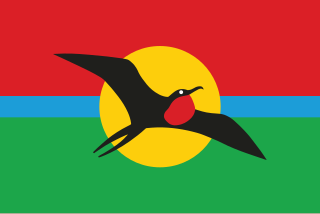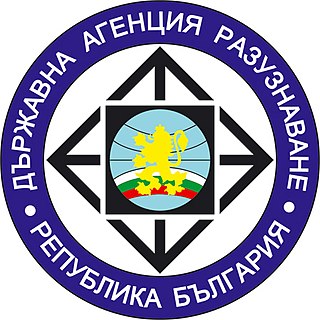Related Research Articles

Antigua and Barbuda is a sovereign archipelagic country in the Caribbean. It lies at the conjuncture of the Caribbean Sea and the Atlantic Ocean in the Leeward Islands part of the Lesser Antilles.

The politics of Antigua and Barbuda takes place in a framework of a unitary parliamentary representative democratic monarchy, wherein the sovereign of Antigua and Barbuda is the head of state, appointing a governor-general to act as vice-regal representative in the nation. A prime minister is appointed by the governor-general as the head of government, and of a multi-party system; the prime minister advises the governor-general on the appointment of a Council of Ministers. Executive power is exercised by the government. Legislative power is vested in both the government and the two chambers of the Parliament. The bicameral Parliament consists of the Senate and the House of Representatives.

The Antigua and Barbuda Defence Force (ABDF) is the armed forces of Antigua and Barbuda. The ABDF has responsibility for several different roles: internal security, prevention of drug smuggling, the protection and support of fishing rights, prevention of marine pollution, search and rescue, ceremonial duties, assistance to government programs, provision of relief during natural disasters, assistance in the maintenance of essential services, and support of the police in maintaining law and order.

The Communications Security Establishment, formerly called the Communications Security Establishment Canada (CSEC), is the Government of Canada's national cryptologic agency. It is responsible for foreign signals intelligence (SIGINT) and communications security (COMSEC), protecting federal government electronic information and communication networks, and is the technical authority for cyber security and information assurance.

The governor-general of Antigua and Barbuda is the representative of the monarch of Antigua and Barbuda, currently King Charles III. The official residence of the governor-general is Government House.

The prime minister of Antigua and Barbuda is the head of government of the Antigua and Barbuda. The prime minister of Antigua and Barbuda is appointed by the Governor-General under the terms of the Constitution.

A government agency or state agency, sometimes an appointed commission, is a permanent or semi-permanent organization in the machinery of government (bureaucracy) that is responsible for the oversight and administration of specific functions, such as an administration. There is a notable variety of agency types. Although usage differs, a government agency is normally distinct both from a department or ministry, and other types of public body established by government. The functions of an agency are normally executive in character since different types of organizations are most often constituted in an advisory role — this distinction is often blurred in practice however, it is not allowed.

The Homeland Security Act (HSA) of 2002, was introduced in the aftermath of the September 11 attacks and subsequent mailings of anthrax spores. The HSA was cosponsored by 118 members of Congress. The act passed the U.S. Senate by a vote of 90–9, with one Senator not voting. It was signed into law by President George W. Bush in November 2002.
The Australian Intelligence Community (AIC) and the National Intelligence Community (NIC) or National Security Community of the Australian Government are the collectives of statutory intelligence agencies, policy departments, and other government agencies concerned with protecting and advancing the national security and national interests of the Commonwealth of Australia. The intelligence and security agencies of the Australian Government have evolved since the Second World War and the Cold War and saw transformation and expansion during the Global War on Terrorism with military deployments in Afghanistan, Iraq and against ISIS in Syria. Key international and national security issues for the Australian Intelligence Community include terrorism and violent extremism, cybersecurity, transnational crime, the rise of China, and Pacific regional security.

The monarchy of Antigua and Barbuda is a system of government in which a hereditary monarch is the sovereign and head of state of Antigua and Barbuda. The current Antiguan and Barbudan monarch and head of state, since 8 September 2022, is King Charles III. As sovereign, he is the personal embodiment of the Crown of Antigua and Barbuda. Although the person of the sovereign is equally shared with 14 other independent countries within the Commonwealth of Nations, each country's monarchy is separate and legally distinct. As a result, the current monarch is officially titled King of Antigua and Barbuda and, in this capacity, he and other members of the Royal Family undertake public and private functions domestically and abroad as representatives of Antigua and Barbuda. However, the King is the only member of the Royal Family with any constitutional role.

The Barbuda Council is a local authority that manages the internal affairs on the island of Barbuda. The council has the authority to buy, acquire, hold, mortgage, and dispose of land and other property. It also possesses a common seal and perpetual succession. The Barbuda Council, which has the authority outlined in the Barbuda Local Government Act, is the government of the island and its coastal zone. The members of the Senate who meet the requirements outlined in paragraph (1) of section 6 of the Barbuda Local Government Act, nine elected members, and the member of the House of Representatives from the Barbuda constituency make up the Council. A Commonwealth citizen who is eighteen years of age or older, was born in Barbuda, is the child of parents who were at least one of their parents' birthplaces, or who has lived in Barbuda for at least three years prior to the date of their nomination for election, and who is a regular resident of Barbuda and a registered voter under the Representation of the People Act are all required to be eligible to be elected as a member of the Council.
The Information Technology Management Reform Act of 1996 is a United States federal law, designed to improve the way the federal government acquires, uses and disposes information technology (IT). It was passed as Division E of the National Defense Authorization Act for Fiscal Year 1996. Together with the Federal Acquisition Reform Act of 1996, it is known as the Clinger–Cohen Act.

The Department of the Prime Minister and Cabinet (PM&C) is a department of the Australian Government with broad-ranging responsibilities; notably, intergovernmental and whole of government policy coordination and assisting the prime minister of Australia in managing the Federal Cabinet. The PM&C was established in 1971 and traces its origins back to the Prime Minister's Department established in 1911.

The following outline is provided as an overview of and introduction to Antigua and Barbuda:

Education in Antigua and Barbuda is compulsory and free for children between the ages of 5 and 16 years. The system is modeled on the British educational system. The current Minister of Education, Sport & Creative Industries is Daryll Sylvester Matthew.

The Malaysian National Security Council (NSC) (Malay: Majlis Keselamatan Negara Malaysia (MKN), Jawi: مجليس کسلامتن نݢارا مليسيا) is a federal agency under the Prime Minister's Department. NSC is the agency responsible for coordinating Malaysia's national security policies and responses. It oversees public order, defense, and essential services at all levels of government. The NSC adapts to emerging threats and issues directives to guide the country's security efforts.

The State Intelligence Agency (SIA) is a Bulgarian foreign intelligence service, which obtains, processes, analyzes and provides the state leadership with intelligence, assessments, analyses and prognoses, related to the national security, interests and priorities of the Republic of Bulgaria.
The National Security Council of Antigua and Barbuda was established in 2006 by The National Security Council Act of 2006. The council serves as the government's main forum for debating issues pertaining to national security, coordinating the policies and actions of the government's departments and agencies in this area, and carrying out any duties assigned to it by legislation. Establishing priorities among activities that address national security interests and requirements, ensuring the collection and collation of information and intelligence relating to Antigua and Barbuda's national security and the integration of that information and intelligence into the government's domestic, foreign, and security policies, and approving policies for departments and agencies of government to follow in relation to national security are all part of the Council's duties. The Council may also recommend to the Minister related to these policies.

Administrative structures for local governments can be found in Antigua and Barbuda. Antigua and Barbuda had seventeen district councils corresponding with the constituencies. Under the direction of the Local Government Officer, the district councils have been categorized into a total of four distinct zones. At a more fundamental level, village councils are encouraged the participation of local citizens. The island of Barbuda has a constitutionally-protected unique status, and it has given the authority to solicit financial contributions in order to meet the needs of its inhabitants.
The national security of Antigua and Barbuda is the collaboration of numerous institutions, including law enforcement, military, paramilitary, governmental, and intelligence agencies that seek to ensure Antigua and Barbuda's national security.
References
- ↑ "The National Security Council Act, 2006" (PDF). laws.gov.ag. Retrieved 19 September 2023.